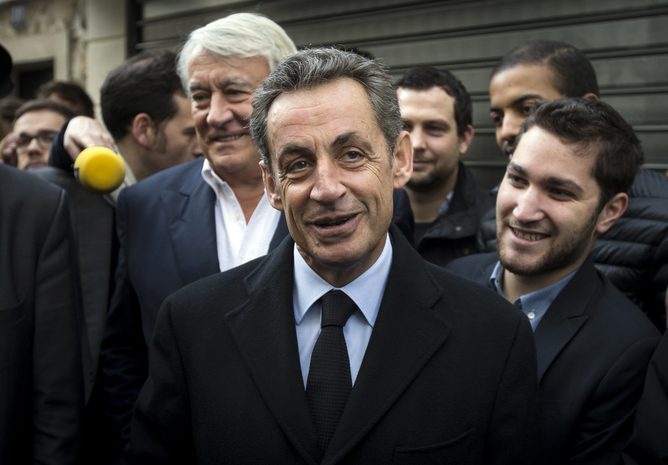
08/12/2014, by CLAS
Sarkozy sets his sights on 2017 election as rivals flounder
Former French president Nicolas Sarkozy has been re-elected as leader of the opposition party the UMP. His candidacy for the 2017 presidential election is still not certain but his rivals are in a state of disarray and may not be able to stop him standing in 2017.
On the eve of the presidential election in 2012, Sarkozy pronounced that if he lost, he would quit politics for good. At the time, it sounded almost like the sort of “après moi le déluge” threats that Charles de Gaulle used to make until, in April 1969, no one cared any more and the general lost his “moment of truth” referendum.
In Sarkozy’s case, France voted instead for his Socialist Party rival François Hollande – the average Joe candidate who promised to be a président normal and turned out to be just plain mediocre.
After his defeat, Sarkozy insisted he would focus on his private life with wife Carla Bruni-Sarkozy and their daughter Juliet – and pursue other career options. The vertiginous collapse in his popularity between 2007 and 2012 suggested that his political career was indeed finished. The other sharks in the water began to circle at the prospect of taking control of the UMP.
Shambles on the right
In Sarkozy’s wake, two men emerged as the front-runners for the UMP leadership and, it was assumed, as the top candidates for the 2017 presidential election. They were Jean-François Copé, a former budget minister and leader of the UMP parliamentary party, and former prime minister François Fillon.
The race was too close to call though and accusations flew back and forth about vote-rigging. Copé eventually emerged victorious but soon ran into accusations of corruption. He was forced to resign in mid-2014, leaving the UMP without a credible figurehead.
A year previously, academic and journalist Thomas Guénolé published a book entitled Nicolas Sarkozy, chronique d’un retour impossible? No-one thought it was beyond the realms of possibility, though. By then, Sarkozy loyalists such as Christian Estrosi, the mayor of Nice, were begging the former president to return, for the sake of the party and the Republic and France. He didn’t really need too much convincing.
Prodigal son
This popularity can’t mask the fact that Sarkozy hardly smells of roses. France’s Constitutional Council refused to reimburse €11m in expenses from Sarkozy’s 2012 election campaign, having concluded that he overspent, and there are other politico-financial affairs that remain unresolved to which Sarkozy’s name has been linked.
Back in 2004, Sarkozy defied Jacques Chirac’s disapproval to win a massive endorsement from 85% of the party membership. His vote in 2014 vote was less emphatic – he polled 65% of the votes, while his main rival Bruno Le Maire secured just short of 30%. Le Maire is not well-known outside France but he is a well-liked politician with hopes for 2022 if not 2017.
The size of Le Maire’s share of the vote is a warning to Sarkozy that the path to candidacy for 2017 is not entirely without obstacle. A significant bloc within the party is less than keen for him to be their man in a stand-off with the Front National’s Marine Le Pen (the Socialists are dead in the water at this point).
He faces a particular challenge from Fillon, who perhaps perversely decided after his run-in with Copé not to seek the party leadership again – and who certainly did not want an early show down with Sarkozy, where a defeat would mean the end of his career. Instead, he sent in Le Maire.
The other potential rival is Alain Juppé, who was prime minister under Jacques Chirac from 1995 to 1997, and holder of the title of least-popular prime minister in the history of the Fifth Republic … until the next one came along.
This was a man stripped of his right to stand for election for two years in 2004, and even of his right to vote in one. Juppé had taken the fall for Chirac after an investigation into vote rigging in Paris. But he began his comeback when he was re-elected mayor of Bordeaux in 2006.
Nowadays, Juppé plays the role of the elder statesman – or as Sarkozy himself put it, someone who makes even him look young. Fillon, on the other hand, seems intent on throwing away a lot of the goodwill he has built up within the party and the electorate with ill-judged outbursts against Sarkozy. He is also wasting a lot of energy at the moment suing two Le Monde journalists for libel after they claimed he had sought to get involved in investigations into Sarkozy’s dealings.
Meanwhile, in the background, a host of younger UMP wannabes, including François Baroin, Nathalie Kosciusko-Morizet and of course Le Maire, are watching the dinosaurs devour each other and keeping their powder dry for 2022.
In 2004, the only vague impediment to Sarkozy’s run to the presidential election of 2007 was Dominique de Villepin. Then, once he had been selected, he capitalised while the Socialist Party’s candidate Ségolène Royal blew an election many thought was unlosable. If he can make it past his old rivals, Sarkozy could once again win the unwinnable.
Paul Smith, Associate Professor in French and Francophone Studies
This post originally appeared on The Conversation.
Photo: EPA/Ian Langsdon
No comments yet, fill out a comment to be the first

Leave a Reply